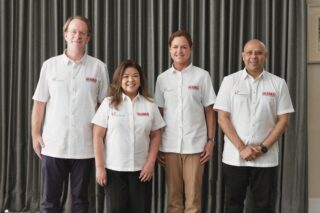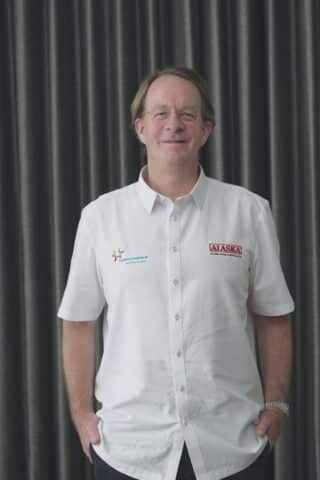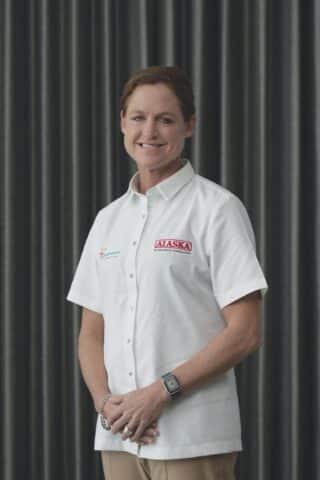Dutch dairy giant seeks closer ties with Filipino families
Written by: Tina Arceo-Dumlao
Separated as they are by distance, language and culture, there seems to be little in common between the dairy farmers of the Netherlands and milk consumers in the Philippines.
But unbeknownst to most of them, there is a strong tie that has bound them since 2012, when Dutch dairy farmers cooperative FrieslandCampina bought into Alaska Milk Corp., maker of the market-leading Alaska milk products.

From farmers to consumers FrieslandCampina and Alaska Milk Corp. are working together to bring the goodness of milk to more FIlipinos. (From left) Jan Derck Van Karnebeek, FrieslandCampina Global CEO; Star Estacio, Alaska Milk Corp. Marketing Director; Corine Tap, FrieslandCampina Business Group Asia President, and Tarang Gupta, Alaska Milk Corp. Managing Director.
And FrieslandCampina Global CEO Jan Derck Van Karnebeek wants those ties strengthened, guided by a desire and commitment to bring milk within easier reach of Filipinos.
FrieslandCampina certainly knows more about milk than most as it is owned by more than 14,000 Dutch dairy farmers, many of whom have been in the vocation of producing milk for generations.
The professionally run cooperative also knows Asia well having been in the region for over 100 years.

Jan Derck Van Karnebeek
“It’s owned by farmers. It’s proud to be a dairy company. Our roots are in the Netherlands, but we also have a long history in Asia,” Van Karnebeek told the Inquirer during his recent visit to the Philippines.
“It’s an interesting combination with these very Dutch roots, with 100 years of Asian presence and also 100 years of insight into nutrition, because you can wonder what’s the value added of Dutch farmers setting up business in Asia. It’s actually a very simple idea of insight, of bringing the nutritional power of milk to Asia,” he added.
Indeed, FrieslandCampina and Alaska was “a very natural combination”, he said, as both have a steadfast commitment to nutrition.
“Fundamentally, [FrieslandCampina] is about nutrition. Getting nutritional value to as many families as possible in the Philippines is our core mission,” Van Karnebeek said.
Flagship products
To do that in the Philippines, Alaska has expanded from the core products of evaporated and condensed milk to milk powders and new combinations to make them more appealing to Filipino families.
“Here in the Philippines, we’ve focused a lot on portion sizes and packaging to make products more affordable. We have also introduced smaller formats, like sachets, to bring a small dose of nutrition within easy reach for more Filipino families,” he said.

Corine Tap
Corine Tap, President of FrieslandCampina Business Group Asia, emphasized the importance of bringing milk closer to Filipino households due to the alarming prevalence of stunting, which compromises children’s long-term mental and physical development, which will in turn, affect a country’s long-term productivity.
FrieslandCampina, through Alaska Milk Corp., wants to contribute to solving that problem by “combining that deep nutrition knowledge, as well as our ability to develop and formulate products that are nutritious and affordable at the same time, with the proximity to the market to as many Filipinos as possible, and that is coming back to ensuring products are in the right packages at the right price points and available in many stores close to where consumers live.”
“This is what leads us. This is what drives us to provide, to nourish, actually, the Filipino next generations through having a great portfolio of products that are at the same time delicious as well as nutritious, affordable and available. That’s what we are about as FrieslandCampina,” Tap added.
She explained that milk is an ideal source of nutrition because it is packed with vitamins, minerals and amino acids that are essential for both the mental and physical development of children.
“Growing up with milk from a young age is important to build the next generations of the people of the Philippines and in Southeast Asia. And because we have the knowledge of the micronutrient deficiency also, we try to formulate our products to be spot on, on what is needed in the country, and in particular here, what is needed for Filipino children growing up healthy,”, said Tap.
Consumption
Affordability is a particular challenge in the Philippines, which helps explain why the country lags behind its peers in the region when it comes to per capita milk consumption.
Tarang Gupta, Managing Director of Alaska Milk Corp., shared that based on the latest data, per capita consumption in the Philippines is about 26 liters of milk a year, far behind Malaysia’s 40 liters and even further behind countries such as the Netherlands and Germany where annual consumption ranges from 250 to 300 liters of milk.
Gupta said Alaska was in a prime position to spur increased consumption as its wide portfolio of products means that its milk products can be consumed throughout the day.
“What makes us unique is that we are in culinary, and we are also in the glass. And that’s why we say that we can contribute to [solving] this micronutrient deficiency in every glass, in every plate,” Gupta said.
This is the message that Alaska Milk Corp. wants to impart to Filipinos, especially the mothers who are the most concerned about the nutrition of their families.
“What we have been trying to convince moms since a year and a half ago is that the classic evaporated milk – which is real milk – can be used to prepare savory dishes. We want to increase her knowledge on how to insert the goodness of milk in the way that not only enhances the taste but also the nutritional value of the meals that she prepares,” added Star Estacio, Alaska Milk Corp.’s Marketing Director.
And standing proudly behind the Alaska products are the farmer-owners of FrieslandCampina who prioritize product quality over a fast profit because they have a long-term view of their business, not bound by the quarterly income statements that typical large firms spend most of their time on.
Van Karnebeek, who joined FrieslandCampina last year after decades in the corporate world, said this business outlook was what drew him to join the company and also why he finds fulfillment in what he is doing today, serving the farmer-owners who are also the suppliers and the consuming public.
“That’s the whole journey, which is what FrieslandCampina is all about globally– grass to glass,” said Van Karnebeek.
FrieslandCampina and Alaska have exciting plans for the Philippines but it will take some time before these come to fruition.
Fortunately, FrieslandCampina has always had a long-term view of its business and the markets where it operates.
For the Philippines, the company sees a bright future with the population that is young and becoming more affluent.
“We are very much convinced that if we take the longer-term horizon, dairy in the Philippines is set to grow. And we are a long-term player,” said Van Karnebeek.
Added Tap: “I would also like say to the Filipino mothers in the country that Alaska has been there for 50 years to support moms to provide daily nourishment, nutrition, taste, develop healthy but also pleasant eating habits, and we’re going to do that for the next 50 years and beyond.”
ADVT.
